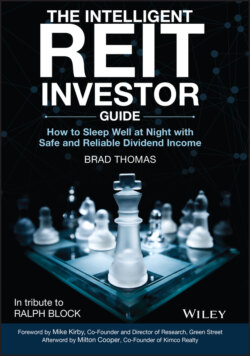Читать книгу The Intelligent REIT Investor Guide - Brad Thomas - Страница 11
REITs Are Liquid Assets
ОглавлениеI've already mentioned that REITs are easy to buy and sell. But you're excused if you'd like to point out how unwieldy commercial real estate can be.
A liquid asset or investment is one with a generally accepted value and accommodating market, where it can be sold easily and quickly at little or no discount to that value. In which case, direct investment in real estate – whether a shopping mall in California or a major office building in Manhattan – is far from liquid. People aren't exactly lining up outside of such buildings ready to buy them at the drop of a hat.
Most publicly traded stocks, however, are liquid, a rule that holds true for REITs. They're real estate – owning investments that enjoy the benefit of a common stock's public market trading and liquidity. So when you buy into them, you're not just buying properties; you're also buying the businesses they belong to. It's like when you buy stock in Exxon; you're buying more than oil reserves.
The vast majority of REITs are public real estate companies overseen by financially sophisticated, skilled management teams with the ability to grow their companies’ cash flows (and dividends) at rates higher than inflation. It's not uncommon to get total annual returns of 8%. All you need is a 4% dividend yield and 4% capital appreciation resulting from 4% annual increases in operating cash flow and property values.
As we'll discuss in a later chapter, management and good corporate governance are critical to those kinds of results. Like other operating companies in the public market, REIT shares have a strong likelihood of increasing in value over time as their properties generate higher cash flows, the values of their properties increase, and they grow their portfolios – all of which management can, should and, in most cases, does add active value to.
Running a REIT isn't always a stress‐free job (especially in the face of a global pandemic and subsequent shutdowns). But there are teams of men and women out there nonetheless who knock it out of the park. They operate their properties to generate steady income, only accepting risk where the odds of success are high. Because they recognize REITs’ unique ins and outs, most of them are exceptionally careful when and where they invest retained earnings.
They search out ways to grow their property portfolios, values, and cash flows by taking advantage of new opportunities as they come along.
